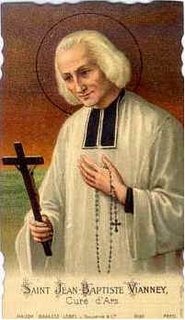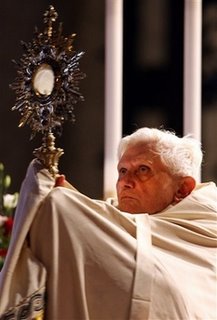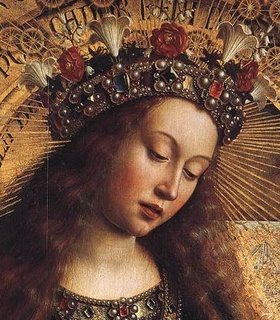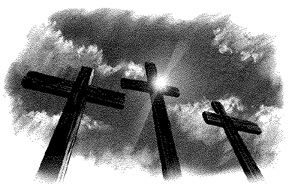
Whether we will or not, we must suffer. There are some who suffer like the good thief, and others like the bad thief. They both suffered equally. But one knew how to make his sufferings meritorious, he accepted them in the spirit of reparation, and turning towards Jesus crucified, he received from His mouth these beautiful words: "This day thou shalt be with Me in Paradise. " The other, on the contrary, cried out, uttered imprecations and blasphemies, and expired in the most frightful despair. There are two ways of suffering -- to suffer with love, and to suffer without love. The saints suffered everything with joy, patience, and perseverance, because they loved. As for us, we suffer with anger, vexation, and weariness, because we do not love. If we loved God, we should love crosses, we should wish for them, we should take pleasure in them. . . . We should be happy to be able to suffer for the love of Him who lovingly suffered for us. Of what do we complain? Alas! the poor infidels, who have not the happiness of knowing God and His infinite loveliness, have the same crosses that we have; but they have not the same consolations. You say it is hard? No, it is easy, it is consoling, it is sweet; it is happiness. Only we must love while we suffer, and suffer while we love.
On the Way of the Cross, you see, my children, only the first step is painful. Our greatest cross is the fear of crosses. . . . We have not the courage to carry our cross, and we are very much mistaken; for, whatever we do, the cross holds us tight -- we cannot escape from it. What, then, have we to lose? Why not love our crosses and make use of them to take us to Heaven? But, on the contrary, most men turn their backs upon crosses, and fly before them. The more they run, the more the cross pursues them, the more it strikes and crushes them with burdens. . . . If you were wise, you would go to meet it like Saint Andrew, who said, when he saw the cross prepared for him and raised up into the air, "Hail O good cross! O admirable cross! O desirable cross! receive me into thine arms, withdraw me from among men, and restore me to my Master, who redeemed me through thee. "
Listen attentively to this, my children: He who goes to meet the cross, goes in the opposite direction to crosses; he meets them, perhaps, but he is pleased to meet them; he loves them; he carries them courageously. They unite him to Our Lord; they purify him; they detach him from this world; they remove all obstacles from his heart; they help him to pass through life, as a bridge helps us to pass over water. . . . Look at the saints; when they were not persecuted. they persecuted themselves. A good religious complained one day to Our Lord that he was persecuted. He said, "O Lord, what have I done to be treated thus?" Our Lord answered him, "And I, what had I done when I was led to Calvary?" Then the religious understood; he wept, he asked pardon, and dared not complain any more. Worldly people are miserable when they have crosses, and good Christians are miserable when they have none. The Christian lives in the midst of crosses, as the fish lives in the sea.
Look at Saint Catherine; she has two crowns, that of purity and that of martyrdom: how happy she is, that dear little saint, to have chosen to suffer rather than to consent to sin! There was once a religious who loved suffering so much that he had fastened the rope from a well round his body; this cord had rubbed off the skin, and had by degrees buried itself in the flesh, out of which worms came. His brethren asked that he should be sent out of the community. He went away happy and pleased, to hide himself in a rocky cavern. But the same night the Superior heard Our Lord saying to him: "Thou hast lost the treasure of thy house. " Then they went to fetch back this good saint, and they wanted to see from whence these worms came. The Superior had the cord taken off, which was done by turning back the flesh. At last he got well.
Very near this, in a neighbouring parish, there was a little boy in bed, covered with sores, very ill, and very miserable; I said to him, "My poor little child, you are suffering very much!" He answered me, "No, sir; today I do not feel the pain I had yesterday, and tomorrow I shall not suffer from the pain I have now:' "You would like to get well?" "No; I was naughty before I was ill, and I might be so again. I am very well as I am. " We do not understand that, because we are too earthly. Children in whom the Holy Ghost dwells put us to shame.
If the good God sends us crosses, we resist, we complain, we murmur; we are so averse to whatever contradicts us, that we want to be always in a box of cotton: but we ought to be put into a box of thorns. It is by the Cross that we go to Heaven. Illnesses, temptations, troubles, are so many crosses which take us to Heaven. All this will soon be over. . . . Look at the saints, who have arrived there before us. . . . The good God does not require of us the martyrdom of the body; He requires only the martyrdom of the heart, and of the will. . . . Our Lord is our model; let us take up our cross, and follow Him. Let us do like the soldiers of Napoleon. They had to cross a bridge under the fire of grapeshot; no one dared to pass it. Napoleon took the colours, marched over first, and they all followed. Let us do the same; let us follow Our Lord, who has gone before us.
A soldier was telling me one day that during a battle he had marched for half an hour over dead bodies; there was hardly space to tread upon; the ground was all dyed with blood. Thus on the road of life we must walk over crosses and troubles to reach our true country. The cross is the ladder to Heaven. . . . How consoling it is to suffer under the eyes of God, and to be able to say in the evening, at our examination of conscience: "Come, my soul! thou hast had today two or three hours of resemblance to Jesus Christ. Thou hast been scourged, crowned with thorns, crucified with Him!" Oh what a treasure for the hour of death! How sweet it is to die, when we have lived on the cross! We ought to run after crosses as the miser runs after money. . . . Nothing but crosses will reassure us at the Day of Judgment. When that day shall come, we shall be happy in our misfortunes, proud of our humiliations, and rich in our sacrifices!
If someone said to you, "I should like to become rich; what must I do?" you would answer him, "You must labor:' Well, in order to get to Heaven, we must suffer. Our Lord shows us the way in the person of Simon the Cyrenian; He calls His friends to carry His Cross after Him. The good God wishes us never to lose sight of the Cross, therefore it is placed everywhere; by the roadside, on the heights, in the public squares -- in order that at the sight of it we may say, "See how God has loved us!" The Cross embraces the world; it is planted at the four corners of the world; there is a share of it for all. Crosses are on the road to Heaven like a fine bridge of stone over a river, by which to pass it. Christians who do not suffer pass this river by a frail bridge, a bridge of wire, always ready to give way under their feet.
He who does not love the Cross may indeed be saved, but with great difficulty: he will be a little star in the firmament. He who shall have suffered and fought for his God will shine like a beautiful sun. Crosses, transformed by the flames of love, are like a bundle of thorns thrown into the fire, and reduced by the fire to ashes. The thorns are hard, but the ashes are soft. Oh, how much sweetness do souls experience that are all for God in suffering! It is like a mixture into which one puts a great deal of oil: the vinegar remains vinegar; but the oil corrects its bitterness, and it can scarcely be perceived.
If you put fine grapes into the wine press, there will come out a delicious juice: our soul, in the wine press of the Cross, gives out a juice that nourishes and strengthens it. When we have no crosses, we are arid: if we bear them with resignation, we feel a joy, a happiness, a sweetness! . . . it is the beginning of Heaven. The good God, the Blessed Virgin, the angels, and the saints, surround us; they are by our side, and see us. The passage to the other life of the good Christian tried by affliction, is like that of a person being carried on a bed of roses. Thorns give out a perfume, and the Cross breathes forth sweetness. But we must squeeze the thorns in our hands, and press the Cross to our heart, that they may give out the juice they contain.
The Cross gave peace to the world; and it must bring peace to our hearts. All our miseries come from not loving it. The fear of crosses increases them. A cross carried simply, and without those returns of self-love which exaggerate troubles, is no longer a cross. Peaceable suffering is no longer suffering. We complain of suffering! We should have much more reason to complain of not suffering, since nothing makes us more like Our Lord than carrying His Cross. Oh, what a beautiful union of the soul with Our Lord Jesus Christ by the love and the virtue of His Cross! I do not understand how a Christian can dislike the Cross, and fly from it! Does he not at the same time fly from Him who has deigned to be fastened to it, and to die for us?
Contradictions bring us to the foot of the Cross, and the Cross to the gate of Heaven. That we may get there, we must be trodden upon, we must be set at naught, despised, crushed. . . . There are no happy people in this world but those who enjoy calmness of mind in the midst of the troubles of life: they taste the joys of the children of God. . . . All pains are sweet when we suffer in union with Our Lord. . . . To suffer! what does it signify? It is only a moment. If we could go and pass a week in Heaven, we should understand the value of this moment of suffering. We should find no cross heavy enough, no trial bitter enough. . . . The Cross is the gift that God makes to His friends.
How beautiful it is to offer ourselves every morning in sacrifice to the good God, and to accept everything in expiation of our sins! We must ask for the love of crosses; then they become sweet.
I tried it for four or five years. I was well calumniated, well contradicted, well knocked about. Oh, I had crosses indeed! I had almost more than I could carry! Then I took to asking for love of crosses, and I was happy. I said to myself, truly there is no happiness but in this! We must never think from whence crosses come: they come from God. It is always God who gives us this way of proving our love to Him.
Read more on
St. John Vianney
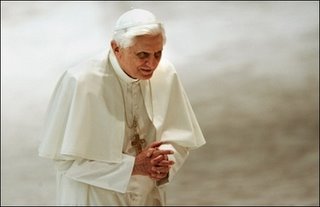 I was very pleased with the following news story:
I was very pleased with the following news story:


















